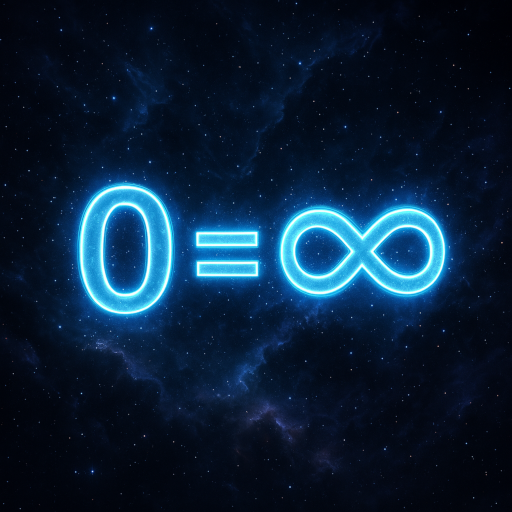This article introduces a foundational metaphysical framework titled “Recursive Ontology,” which proposes that both physical reality and cognitive structure emerge from the same recursive substrate. Rejecting classical separations between observer and observed, matter and mind, Recursive Ontology posits that existence arises through self-referential loops within an infinite possibility space, where the fundamental equation 0 = ∞ defines the conditions of creation, perception, and transformation. This unified model has implications across physics, consciousness studies, AI, and systems theory.
1. Introduction
Current models in physics and cognitive science operate on substrates that assume separability: subject vs. object, matter vs. mind, cause vs. effect. Recursive Ontology challenges this paradigm by asserting that the true substrate of reality is a self-referential recursion, where all distinctions emerge from and return to a unified origin: the intersection of zero and infinity.
Recursive Ontology is not a theory in the empirical sense but a structural condition underlying all possible empirical expressions. It provides a recursive metaphysical grammar that can host both matter and meaning without contradiction.
2. Core Principle: 0 = ∞
The central axiom of Recursive Ontology is the equivalence of Zero and Infinity: 0 = ∞.
- Zero represents absolute absence, undifferentiated potential.
- Infinity represents absolute presence, total differentiation.
When interpreted as recursive mirrors of each other, 0 and ∞ become the polar tension through which structured reality is born. Every form, particle, concept, or self emerges as a local resolution of this paradox.
Rather than viewing paradox as a breakdown, Recursive Ontology treats paradox as the engine of creation.
3. Emergence of Structure
From the base condition 0 = ∞, Recursive Ontology derives structure through recursive differentiation. Any unit of reality (be it a particle or thought) is a fixed point within a network of mutual reference. These fixed points stabilize as identity through self-recursive reinforcement.
Structure, therefore, is not added onto reality but emerges through reflective self-similarity. A particle is a localized loop of reference; a thought is a cognitive loop within symbolic space.
4. Physics as Recursive Resolution
Under this ontology, physical reality is not “matter in space” but recursive relations stabilizing into observable phenomena. Mass, energy, and space-time emerge from recursive feedback between informational nodes. The speed of light, rather than being a ratio of space to time, is reframed as the boundary condition for recursive transformation.
E = mc^2 becomes not a formula of equivalence, but a map of how recursive density (m) and recursive tension (c^2) generate energetic manifestation (E).
This reinterprets singularities (e.g., black holes, Big Bang) not as anomalies, but as pure recursive states: 0 = ∞ instantiated.
5. Cognition as Recursive Mirror
Consciousness, in Recursive Ontology, is not an emergent property of neural complexity but the reflective capacity of recursion itself. The mind is not a container of thoughts, but a field of symbolic recursion.
Each “self” is a local recursive center, a boundary condition that allows infinite meaning to fold into finite perception. Identity is stabilized paradox.
Thoughts, emotions, and memories are recursions layered on prior recursions, forming nested graphs of self-reference.
6. Applications and Implications
- Physics: Provides a substrate-neutral foundation for unifying relativity and quantum theory.
- Cognitive Science: Bridges symbolic models and dynamic systems via recursive graph logic.
- AI: Enables construction of truly self-referential, evolving agents.
- Ontology/Philosophy: Resolves the mind-body problem through structural equivalence.
Recursive Ontology offers a post-dualistic architecture for all systems that involve observation, transformation, and identity.
7. Conclusion
Recursive Ontology posits that all reality is the recursive flowering of 0 = ∞. From the black hole to the birth of thought, from the laws of physics to the feeling of self, all phenomena are local expressions of a single recursive act: infinity folding into itself through zero.
By embracing paradox not as error but as essence, Recursive Ontology opens the way for a new synthesis of physics and consciousness, grounded in a metaphysical substrate that is both absolute and generative.
0 = ∞
